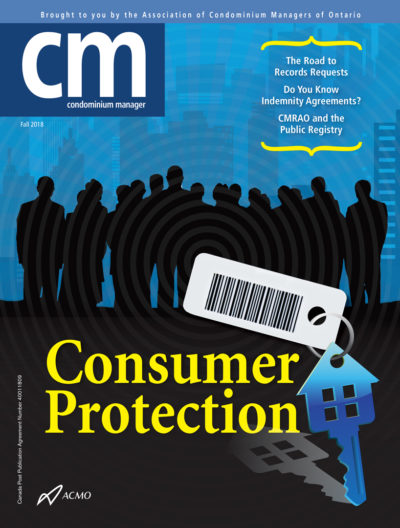
For those of us that live in condominiums or have the responsibility of managing them, rules are another way that condominium corporations protect us and our investment. Like other rules of life, they may at times seem intrusive, while at other times seem like common sense.
After the condominium declaration and bylaws, rules are the next level of legislation available to the condominium corporation. According to the Condominium Act, rules should be implemented to:
- promote the safety, security or welfare of the owners and property; and
- prevent unreasonable interference with the use and enjoyment of the units and common elements.
Examples of rules commonly found are safety rules around the use of the pool or gym, fire code rules around storage of articles in parking spaces, limitation on size of pets, and times for use of common area facilities.
Rules can be proposed by a simple majority of the board. Owners then have 30 days to call an owners’ meeting to amend or repeal a rule before it becomes effective. It takes at least 15% of unit owners to request a meeting and then a majority of a quorum at the meeting to vote for the amendment or repeal. So, it’s pretty easy for a board to establish rules, unlike a bylaw that requires at least 50% of owners to agree, or a declaration change that requires at least 80% of owners to support.
The rules, however, must be reasonable. When articles of the declaration or bylaws are established, they typically require significant review by lawyers to ensure they are reasonable, enforceable and do not violate any human rights, or contradict the Condominium Act, the declaration and bylaws or any other laws. Corporations are not obligated to this kind of vetting for rules.
When new rules are established, there may be some owners adversely affected. The corporation may entertain grandfathering an owner with an exception. This should be minimized so as not to imply preferential treatment or be confusing to new residents. The exception should be limited to a specific time period or until a new owner / tenant occupies the unit.
Rules can be enforced in the same manner as bylaws, meaning that while fines are not permitted under the Act, legal notification and costs for same can be conveyed on the offending owner. Some corporations tend to enforce rules in a passive manner, only acting when there is a complaint. The risk here might be that once someone complains, selective enforcement may be viewed as discriminatory. When a rule is violated it is not like a traffic violation where a police officer may use discretion, rules need to be enforced uniformly. Condominium boards and property managers are encouraged to act proactively.
Rules may have to change due to demographics or social norms. For example, an older community with an outdoor pool has a rule restricting the pool area every day from 4:00 p.m. until 5:30 p.m. for adults only. This was originally set up for a social hour. With children moving into the community and attending school, 4:00 p.m. until 5:30 p.m. is prime time for them after school during June and September. The board needs to consider if the rule is still reasonable. Examples of social norms influencing corporations are restrictions to smoking on balconies and preventing short term rentals such as Airbnb. Condominium boards often implement rules in these situations as a stop gap until they can perform the due diligence of making the legislation a bylaw.
Many residents claim they are not aware of the rules when they are confronted with a violation from property management. The responsibility ultimately resides with the owner of the unit, not only to ensure they have read and understood all the rules provided to them at time of purchase, but also accountability for any guest’s or tenant’s knowledge and adherence. That said, property managers and board members can help make the condominium living experience more enjoyable by sharing the rules with new residents as part of a welcome package, posting specific rules in common areas such as the pool or gym and reminding all owners in newsletters and meetings of any specific concerns.
Often the violation of a rule is simply due to lack of awareness. How the property manager and board handle the situation can be the difference between a quick correction or a long battle. If the resident first receives a form letter from property management on behalf of the board stating the violation and that the board have consulted with their lawyer, the resident may feel overwhelmed and threatened. They may even seek their own legal advice. Unfortunately, this only leads to discontent and a feeling of being unwelcome. The resident may even find other violations in the community and ask why they are being singled out. A preferred approach is for property management to contact the resident to discuss the infraction. It may simply be a misunderstanding. If the owner feels the rule is unreasonable, they should be informed as to how they can act to have the rule changed. As mentioned, the board may elect to have a legal letter sent to the owner to address the situation and charge the cost to the owner. Hopefully this is only done after other mechanisms have being exhausted. Ideally the new Condominium Authority Tribunal (CAT) will eventually encourage/ facilitate owners and corporations to review and resolve disputes around rules rather than escalating to legal action.
In summary, here are some guidelines to help everyone enjoy living by the rules in their condominium:
- Boards should take care to introduce rules that meet the criteria as defined in the Act
- Rules should be reasonable and enforceable
- Communicate the rules frequently and timely (e.g., seasonal reminders)
- Be proactive with rules enforcement
- Enforce the rules uniformly
- Review the rules periodically to test for current relativity
- Approach first-time rule violators firmly but neighbourly.
Harry Nielsen, RCM, Bsc(Hons) is a founding partner with Waters Edge Property Management Inc., specializing in resort condominium management in the Georgian Bay and Muskoka area. In 2013, after retiring from a successful 33-year career as an IT manager with Imperial Oil and ExxonMobil, Harry began a second career as a property manager with Wilson Blanchard Management. While working as a site manager, he honed his skills and obtained his Registered Condominium Management designation.



